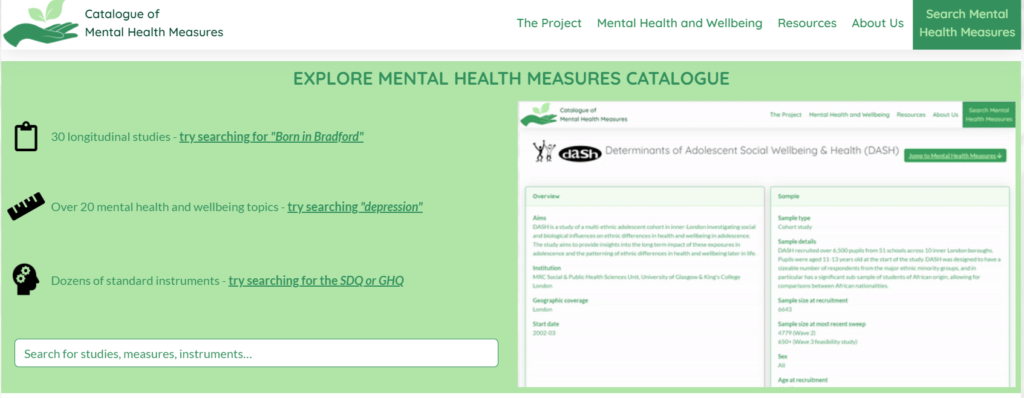 Louise Arsenault introduces the vision behind the Catalogue of Mental Health Measures.
Louise Arsenault introduces the vision behind the Catalogue of Mental Health Measures.
Every season brings its own natural wonders. Spring and autumn are especially splendid with the cycle of sowing seeds with the warm weather and harvesting the fruits of this labour as the cold creeps in.
The connections and the natural beauty of these two seasons are reflected in the Catalogue of Mental Health Measures. British cohort and longitudinal studies have continuously collected mental health data, planting the seeds for high quality research that can answer key questions related to population mental health and wellbeing.
The Catalogue is a platform designed to facilitate the harvest of these data and facilitate mental health research by providing easy access to information about the mental health and wellbeing measures in British cohort and longitudinal studies.
A tool for maximising the take up of mental health measures in cohort and longitudinal studies
The Catalogue compiles and organises details on the full spectrum of mental health topics and related measures from 46 ongoing studies. Together, these studies cover 9 decades of data collection and over 4,000 mental health measures from 427 data collection points.
The Catalogue features descriptions of the studies as well as the instruments used to assess mental health and wellbeing. It also includes fine-grained details on each measure such as the items, informants, response scale and reporting period.
By providing this detailed information, the Catalogue aims to facilitate harmonisation work and cross-cohort research.
Users can explore existing data by searching for a specific study, a mental health topic, or an instrument. For example, someone may look for which studies have collected measures of depression in childhood, or when wellbeing measures have been collected by a specific study.
Information for each study is provided on a searchable timeline to illustrate the richness of these longitudinal resources over time. Sprouts grow from the timeline to indicate that measures have been collected at different time points!
The vision behind the Catalogue of Mental Health Measures
I was appointed in 2016 as the ESRC Mental Health Leadership Fellowship to champion the role of the social sciences within mental health research. This was a great challenge well suited for me as I spent over 20 years researching the contribution of environmental risk factors for the development of mental health problems using various cohort studies.
The ambition of this Fellowship is to support mental health research thriving in the social sciences, and to encourage social science growing in mental health research. The Catalogue contributes to this endeavour by improving the visibility and accessibility of mental health measures to researchers from various disciplines who may be less familiar with the mental health field, and by facilitating the use of the incredibly rich mental health data currently available in the UK’s longitudinal studies.
We launched the Catalogue in November 2019 and after 18 months running, we discovered the Catalogue can be useful to numerous stakeholders interested in mental health, not only to data users who are planning their next paper or grant application.
For example, principal investigators may be interested in exploring the measures most commonly included by other studies when planning future data collection, while funders may use the Catalogue to get an overview of what mental health topics need further investment.
The Catalogue may be particularly useful for early career researchers so they can build their portfolio of publications utilising data that have been already collected at a stage when they are still seeking their own funding, or for postgraduate students planning their dissertation projects using longitudinal data.
We were left a message after an introductory webinar saying:
“Impressive work, thanks for the helpful introduction! Just used the Catalogue to check I did not miss an important measure in my study – very useful!”
The process of building the Catalogue
All the information on the Catalogue is the result of a thorough review of masses of documentation found online or provided by the study teams.
The reviewing process was narrowed down to mental health and wellbeing measures that targeted the study participants and prior generations (e.g., parents, grand-parents, teachers). Once the review was finished, we contacted the study teams and asked if they could verify that the information was accurate and complete. We are extremely grateful to the study teams as they all contributed time and provided their seal of approval. Working with them was one of the most rewarding and fun parts of the process.
We conceptualised the Catalogue as a dynamic tool which needs constant updating to follow the progress of the studies.
For example, in 2020 we had to adjust our plans and incorporate a section on Covid-19 to account for the new data collected by many of the studies to document the impact of the pandemic on mental health and wellbeing. The cohort and longitudinal studies are essential for providing key findings in this area, as they have collected measures of mental health prior to the pandemic and they allow important comparisons across pre- and post-Covid.
As time goes on, we also plan to expand the scope of the Catalogue to include measures such as temperament and personality, that are not direct indicators of mental health problems but are clearly closely related.
Other important resources for mental health research
The Catalogue provides information about each study’s data access policy but it does not provide direct access to the data. However, that is exactly what the ESRC-funded UK Data Service does. Data for several studies covered by the Catalogue are held and managed by the UK Data Service including the National British Cohorts and the Adult Psychiatric Morbidity Survey (APMS).
The Catalogue will be part of the new MRC Mental Health Data Hub in partnership with Health Data Research UK.
This new hub will aim to provide the evidence base to help understand what is most effective at an individual, community or population level to prevent, treat and manage mental health problems and to intervene at an earlier stage. The hub will include a broad range of data sources to reflect the multi-dimensional determinants of mental health and their inter-related longitudinal impacts.
Interesting facts that emerged from reviewing the cohort and longitudinal studies
The development of the Catalogue has shed light on the wealth of mental health data collected in British longitudinal studies. The first data collection point we reviewed took place in 1932 and participants are still part of the study today.
The Catalogue compiles information on a total of 31 mental health topics. Studies in the Catalogue have recruited participants across the lifecourse, ranging from recruiting infants at birth to elders after their 85th birthday. The Catalogue includes birth cohorts, twin studies, ageing studies, repeated cross-sectional studies, accelerated longitudinal designs, and a household panel study. Some were specifically designed to focus on mental health, while others have included mental health measures in the context of more multi-purpose studies.
Most users are based in the UK but 36% are from overseas including America, Europe and Asia making the Catalogue a valuable tool for the community of mental health researchers world-wide.
This week we celebrate mental health and nature with the Mental Health Foundation’s Mental Health Awareness week. The Catalogue of Mental Health Measures supports these themes all year around, aiming to assist cohort studies watering the seeds of mental health measures and helping researchers harvesting data through their research.
Further information
Explore the Catalogue of Mental Health Measures
Find out more about Health Data Research UK
The Catalogue is funded by CLOSER and the ESRC
About the author
Louise Arseneault is a Professor of Developmental Psychology at King’s College London and ESRC Mental Health Leadership Fellow. Follow her on Twitter @L_Arseneault
Louise’s colleagues:

Bridget Bryan is a PhD student and Research Assistant at King’s College London. Twitter: @briddycent

Barbara Maughan is a Professor of Developmental Epidemiology at King’s College London.

Lily Strange is Research Assistant at King’s College London. Twitter: @lilykstrange

